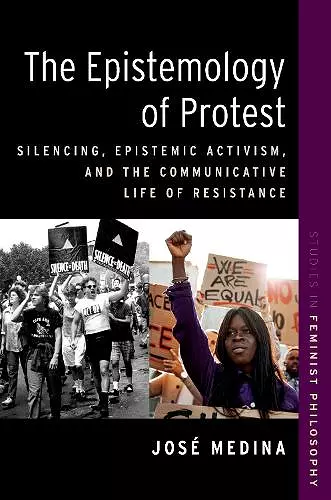The Epistemology of Protest
Silencing, Epistemic Activism, and the Communicative Life of Resistance
Format:Hardback
Publisher:Oxford University Press Inc
Published:12th May '23
Currently unavailable, and unfortunately no date known when it will be back
This hardback is available in another edition too:
- Paperback£26.49(9780197660911)

The Epistemology of Protest offers a polyphonic theory of protest as a mechanism for political communication, group constitution, and epistemic empowerment. The book analyzes the communicative power of protest to break social silences and disrupt insensitivity and complicity with injustice. Philosopher José Medina also elucidates the power of protest movements to transform social sensibilities and change the political imagination. Medina's theory of protest examines the obligations that citizens and institutions have to give proper uptake to protests and to communicatively engage with protesting publics in all their diversity, without excluding or marginalizing radical voices and perspectives. Throughout the book, Medina gives communicative and epistemic arguments for the value of imagining with protest movements and for taking seriously the radical political imagination exercised in social movements of liberation. Medina's theory sheds light on the different ways in which protest can be silenced and the different communicative and epistemic injustices that protest movements can face, arguing for forms of epistemic activism that resist silencing and communicative/epistemic injustices while empowering protesting voices. While arguing for democratic obligations to give proper uptake to protest, the book underscores how demanding listening to protesting voices can be under conditions of oppression and epistemic injustice. A central claim of the book is that responsible citizens have an obligation to echo (or express communicative solidarity with) the protests of oppressed groups that have been silenced and epistemically marginalized. Studying social uprisings, the book further argues that citizens have a duty to join protesting publics when grave injustices are in the public eye.
This is an immensely important book for our times. Medina provides new critical analyses of how dissent can be silenced and subtly disarmed in ways that escape the charge of censorship. He explores how protests challenge standard ideas about both knowledge and communication. And he also demonstrates, more hopefully, how social movements transform public spheres in a productive manner that outlives the current moment. * Linda Martín Alcoff, Professor of Philosophy, City University of New York *
Medina offers a theoretically nuanced and empirically rich account of protest as 'communicative resistance' that can produce new varieties of collective learning and public inquiry. He argues that we have both a duty to protest injustice and a duty to listen actively to others' protests against injustice-even when their protests seem to be 'uncivil.' He shows that the duty to take resistance to injustice seriously is among the most important democratic responsibilities that we have. * Michele Moody-Adams, author of Making Space for Justice *
The Epistemology of Protest fortifies José Medina's position as one of our most influential thinkers in the field of epistemic justice. Medina brilliantly applies his groundbreaking work on epistemic injustice and epistemic resistance to street activism and protest movements. At a time when democratic ideals are threatened by reactionary white supremacist movements, this book promises to provide a much-needed path to effective liberatory activism. * Nancy Tuana, author of Racial Climates, Ecological Indifference *
Medina's book is an important contribution to the tasks of clarifying and resisting the challenges to protest, especially those in service of progressive and liberatory goals. It is, above all, a timely book. * Chong-Ming Lim, Ethics *
The Epistemology of Protest presents a comprehensive and nuanced investigation, especially regarding the various forms of silencing and epistemic injustice that protests often encounter. Medina's thorough defense of uncivil protest, combined with a focus on the internal life of protest and our normative obligations toward protest, offers a significant, provocative shift in the discourse surrounding protest. * Catharine Saint-Croix, Criminal Law and Philosophy *
ISBN: 9780197660904
Dimensions: 156mm x 235mm x 29mm
Weight: 757g
450 pages